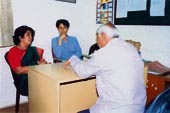 |
| Trouble-shooting: Elders Helpline counsellors advise an aged person in distress |
Apassion for bioinformatics leaves no room for boredom. Dr Savitri Reddy is 70 and lives alone in Bangalore. The retired Delhi University professor closely follows every new development in biotechnology and says she doesn’t miss having a family or people for company. “Old age doesn’t have to mean being lonely and dependent,” she says.
It helps to have a support system, though. Last year, Reddy’s medical insurance firm refused to pay up when she was admitted to hospital. At another time, when Reddy was flying to Coimbatore to meet relatives, the airline did not give her a senior citizen discount. “I wanted to sue the company, but running around courtrooms and lawyers was beyond me,” says Reddy.
That’s when she called Bangalore’s free Elders Helpline telephone service. The helpline’s in-house lawyers filed a case in the consumer court against the medical insurance firm. They also sent a legal notice to the airline, asking them to refund Reddy’s money. When the company didn’t comply, the police was called in for some strong-arm tactics. “I got my money back. And I was happy that the company couldn’t ride roughshod over me,” says Reddy.
The Elders Helpline ? launched in Bangalore in 2002 ? is run as a joint venture between the city police and a local NGO, the Nightingale’s Medical Trust. The helpline has registered 25,000 complaints so far, says S. Premkumar Raja, Trustee, Nightingales Medical Trust. In its first year of operation, it received 10 calls a day. The number has shot up to 30 calls a day now.
Increasing workload called for expansion. From June 15, the Elders Helpline service has been made available at eight police stations across Bangalore. The helpline also caught the state government’s eye. From this year, it is being fully financed by the Department for the Welfare of Disabled and Senior Citizens. Also, taking a cue from the Bangalore service, the department has launched similar helplines in four towns in Karnataka ? Mysore, Gulbarga, Hubli-Dharwad and Belgaum.
The project started off on a small scale ? in a tiny tin-shed room in the Bangalore police commissioner’s office. The staff strength totalled five social workers and three police constables. “The helpline began as an experiment,” says Raja.
Senior citizens make up 15 per cent of Bangalore’s population ? as compared to a national average of 8 per cent. “Young, working people have taken over Bangalore. Pensioners are getting marginalised. The helpline is an attempt to sensitise people towards elders,” says Radha S. Murthy, managing trustee of the NGO.
The helpline is a one-stop shop for all elders’ issues, claims Raja. Trained counsellors offer advice and motivation to lonely elders. Legal problems are handled by three lawyers who work on a freelance basis for the helpline. The police have deputed three constables with the helpline service, and the cops take care of problems of physical abuse and harassment.
In fact, physical abuse tops the charts of senior citizens’ problems. Of the 25,000 complaints received by the helpline, 41 per cent were from elders harassed by family members. Another 22 per cent complained that they were harassed and cheated by outsiders. And 12 per cent complained of being cheated by private and public agencies.
People take senior citizens lightly, says Savitri Reddy. “I have to call the grocery store several times before they deliver my ration. They know I’m too old to stomp to the store and throw a tantrum,” she says.
Grocery store owners can be ignored. Family is another matter. Kamalamma, a 70-year-old widow, says she was thrown out of the house by her children because her husband died without leaving a will. “They thought their mother would grab all the property,” says Murthy.
Kamalamma called the Elders Helpline. “Our lawyers helped divide the property and added a clause that the children will have to look after their mother,” says Raja.
At times, the helpline runs into a wall. Nagappa, a 65-year-old retired government official, was taken by surprise when his children said they couldn’t look after him. “They told him he earned a pension and could comfortably live alone,” says Raja. Nagappa slipped into a depression and contemplated suicide. As a last-ditch effort at reconciliation with his family, he called the Elders Helpline.
This time, though, the helpline’s counsellors couldn’t help. “Nagappa’s children couldn’t understand why their financially-independent father needed to live with them,” says Raja. The only way out was to teach Nagappa to live alone, enjoy his own company and fill his time doing social work and engage in a bit of socialising.
The helpline, to twist the old adage, clearly helps those who help themselves ? and those who cannot.










